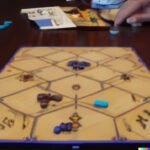Are you ready to conquer the Seven Kingdoms and claim the Iron Throne? In this article, we will explore the world of Game of Thrones board game starting strategies. Whether you’re a seasoned player or a newcomer to the game, mastering the art of diplomacy, combat, and resource management is crucial to achieving victory.
The Game of Thrones board game is a strategic tabletop game based on the popular book series by George R.R. Martin and the hit HBO show. Players take on the roles of noble houses vying for control of Westeros through cunning tactics and shrewd decision-making. With its complex game mechanics and unpredictable events, it offers an immersive experience that challenges players to outmaneuver their rivals.
Before delving into specific strategies, it’s important to gain a thorough understanding of the game mechanics. From navigating political alliances to engaging in fierce battles, each aspect of gameplay requires careful consideration and foresight. Additionally, selecting the right house and characters can significantly impact your chances of success on the battlefield as well as in diplomatic negotiations.
Throughout this article, we will delve into essential starting strategies for mastering the Game of Thrones board game. We’ll cover everything from alliance-building and resource management to combat tactics and handling unexpected events. By developing a strong foundation in these key areas, players can position themselves for long-term success in their quest for dominion over Westeros.
Understanding the Game Mechanics
The Game of Thrones Board Game, based on the popular book and television series, is a strategic board game that requires players to use diplomacy, warfare, and resource management in order to conquer the Seven Kingdoms and secure the Iron Throne. Understanding the game mechanics is crucial to success in this intense and challenging game.
Understanding House Cards and Influence Tracks
House cards are an essential element of the game, as they represent each player’s military strength and special abilities. It is important for players to understand the strengths and weaknesses of their house cards in order to effectively strategize their moves. Additionally, influence tracks determine turn order and play a significant role in securing victory points. Understanding how these tracks work can provide players with a strategic advantage.
Mastering Supply and Consolidation
Supply and consolidation play a key role in the game’s mechanics as they directly impact a player’s ability to expand their territories and maintain control over them. Players must carefully consider how to manage their limited resources while expanding their influence across Westeros. Strategic placement of supply tokens and consolidation of forces are crucial for long-term success in the game.
Utilizing Wildling Threats to Your Advantage
The unpredictable nature of wildling threats can greatly affect gameplay by introducing chaos and uncertainty into the mix. Players who understand how to navigate these threats can use them strategically to their advantage, whether by leveraging them against opponents or mitigating their negative effects on their own position in the game.
By mastering these fundamental mechanics of the Game of Thrones Board Game, players can lay a strong foundation for developing effective strategies that will increase their chances of emerging victorious in this epic battle for dominance.
Choosing the Right House and Characters
When playing the Game of Thrones board game, choosing the right house and characters can greatly impact your chances of success. Each house has its own strengths and weaknesses, so it’s important to consider your play style and strategy when making this decision. Here are some tips for choosing the right house and characters:
1. Understand the House Abilities: Each house in the game of thrones board game has unique abilities that can be used to your advantage. Whether it’s Martell’s ability to move units into enemy territory or Stark’s resilience in combat, understanding these abilities will help you make an informed decision.
2. Consider Your Play Style: Are you more inclined towards aggressive military strategies or subtle diplomacy? Different houses cater to different play styles, so it’s important to choose a house that aligns with your preferred approach.
3. Evaluate Starting Positions: The starting positions of each house on the map can also influence your decision. Take into account factors such as proximity to valuable territories and potential allies, as well as vulnerabilities to enemy attacks.
By carefully considering these factors, you can increase your chances of success in the game of thrones board game starting strategies.
Remember that choosing the right characters within your chosen house is also crucial. Each character brings their own unique abilities and strengths to the table, so be sure to select a combination that complements your overall strategy. With thoughtful consideration and strategic planning, you can set yourself up for a strong start in the Game of Thrones board game.
Importance of Alliances and Diplomacy
The “Game of Thrones Board Game” is a highly strategic and immersive game that requires careful planning, resource management, and clever tactics to emerge victorious. While individual skill and decision making are important, the game also heavily emphasizes the significance of alliances and diplomacy. In this section, we will explore the importance of forming alliances, negotiating agreements, and navigating the delicate balance of power in the game.
One of the key starting strategies in the “Game of Thrones Board Game” is to carefully consider potential allies and negotiate alliances from the very beginning. Forming strong alliances can provide crucial support, protection, and additional resources throughout the game. It’s essential to identify which players are strategically positioned on the board and may benefit from an alliance with your house. Similarly, understanding each house’s strengths and weaknesses can help in selecting the most compatible allies.
Diplomacy plays a central role in fostering alliances and managing relationships with other players. Effective negotiation skills are vital for securing favorable agreements, maintaining trust, and avoiding betrayals. Furthermore, diplomatic discussions can influence game dynamics by shaping perceptions of power, creating temporary truces or partnerships, and potentially reshaping the overall balance of power on the map.
Another aspect to consider in terms of alliances and diplomacy is managing relationships with neighboring houses while not neglecting strategic positioning or leaving yourself vulnerable to attack. Balancing these concerns is crucial for long-term success as overcommitting to alliances may limit future options or result in betrayal while ignoring diplomacy entirely may leave you isolated without any backup support.
| Strategy | Description |
|---|---|
| Form Alliances Early | Identify potential allies from early on in the game to secure much-needed support. |
| Effective Negotiation | Develop strong negotiation skills to secure favorable agreements with other players. |
| Strategic Diplomacy | Create diplomatic relationships with neighboring houses while balancing strategic positioning. |
Tips for Managing Resources and Territories
After choosing the right house and characters, managing resources and territories is crucial for success in the Game of Thrones board game. Without a well-managed economy and controlled territories, it can be difficult to maintain a strong position in the game. Here are some tips to help you effectively manage your resources and territories.
First and foremost, it is important to focus on consolidating your power in specific regions rather than spreading yourself too thin. By concentrating your forces in a few key areas, you can better defend and control those territories, as well as leverage them for future expansion.
Additionally, prioritize securing supply barrels to ensure that your armies are adequately supplied. Without sufficient resources, your forces may become vulnerable and unable to make strategic moves. It is also essential to consider how you allocate power tokens in order to maintain control over territories and gain influence where necessary.
Furthermore, pay attention to the Westeros cards that affect resource management and territory control. These cards can have significant impacts on gameplay, so being aware of their potential effects and planning accordingly can give you a strategic advantage.
By implementing these tips for managing resources and territories effectively, players can position themselves for success in the Game of Thrones board game starting strategies while also remaining flexible enough to adapt as the game progresses.
Combat Strategies and Tactics
In the Game of Thrones board game, mastering combat strategies and tactics is essential for achieving victory. This section will provide valuable insights into how to effectively plan and execute your military actions on the game board.
Understanding Combat Mechanics
Before diving into battles, it’s crucial to have a solid grasp of the combat mechanics in the game. Understanding factors such as unit strength, support orders, and siege engines will give you a strategic advantage on the battlefield. Additionally, familiarizing yourself with House cards and their unique abilities can significantly impact the outcome of a skirmish.
Formulating Battle Plans
When preparing for combat, consider the strengths and weaknesses of your opponents’ forces. Analyze their position on the map and anticipate their next moves. Formulating comprehensive battle plans that account for various scenarios will increase your chances of success on the battlefield. It’s also important to assess the potential risks and rewards of engaging in conflicts, as well as considering diplomatic options before committing to war.
Adapting to Changing Situations
Flexibility is key when it comes to combat in the Game of Thrones board game. As unexpected events and intrigues unfold throughout the game, be prepared to adapt your strategies accordingly. Remaining agile in your approach to warfare will allow you to capitalize on opportunities and mitigate any unforeseen challenges that may arise.
By incorporating these combat strategies and tactics into your gameplay, you’ll be better equipped to navigate the treacherous political landscape of Westeros and lead your chosen House to victory.
Dealing With Unexpected Events and Intrigues
In the Game of Thrones board game, dealing with unexpected events and intrigues can be a make or break factor in determining your success. From unpredictable wildling attacks to sudden betrayal from an ally, these events can significantly alter the course of the game. Therefore, it is crucial to have a plan in place to effectively navigate through these challenging situations.
One key strategy for handling unexpected events and intrigues is to always have a backup plan. Whether it’s a sudden shift in alliances or the loss of a critical territory, being able to adapt and pivot quickly can save you from total defeat. Additionally, staying informed about other players’ actions and intentions can help you anticipate potential threats and prepare accordingly.
Another important aspect to consider when dealing with unexpected events is to maintain flexibility in your overall strategy. While it’s essential to have a long-term plan for victory, being too rigid can leave you vulnerable when faced with unforeseen circumstances. By keeping an open mind and being willing to adjust your approach as needed, you can better position yourself to overcome any challenges that may arise.
Finally, building strong relationships with other players through diplomacy and negotiation can be instrumental in mitigating the impact of unexpected events. Forming alliances based on trust and mutual benefit can provide you with much-needed support during difficult times. However, it’s also important to remain cautious and aware of potential betrayals, as not everyone may have your best interests at heart.
| Strategy | Description |
|---|---|
| Backup Plan | Having alternative strategies in place for when unexpected events occur. |
| Flexibility | Being adaptable and open-minded when faced with unforeseen circumstances. |
| Diplomacy | Building strong relationships with other players through trust and mutual benefit. |
Advanced Strategies for Long-Term Success
After mastering the basics of the Game of Thrones board game, it’s time to delve into advanced strategies for long-term success. These strategies are essential for players who want to take their gameplay to the next level and dominate the Seven Kingdoms. Here are some advanced tactics to consider:
- Long-Term Planning: In order to achieve victory in the Game of Thrones board game, players must adopt a long-term mindset. This involves setting goals for future rounds and making strategic decisions that will benefit them in the later stages of the game.
- Political Maneuvering: Diplomacy and alliances play a crucial role in securing long-term success in the game. Players should focus on building strong alliances with other houses while simultaneously undermining their opponents through political maneuvering and clever negotiation tactics.
- Adapting to Changing Situations: The game is unpredictable, and unexpected events can dramatically shift the balance of power in the Seven Kingdoms. Players must be prepared to adapt their strategies based on changing circumstances and be flexible in their approach.
Implementing these advanced strategies requires a deep understanding of the game mechanics, as well as an ability to think several steps ahead. By combining these tactics with a solid understanding of combat strategies, resource management, and character selection, players can significantly increase their chances of achieving long-term success in the Game of Thrones board game starting from round one.
Conclusion and Final Thoughts
In conclusion, the Game of Thrones Board Game is a complex and strategic game that requires careful planning, decision-making, and diplomacy to succeed. Understanding the game mechanics, choosing the right house and characters, forming alliances, managing resources, and engaging in combat are all crucial aspects of the game. It’s also important to be prepared for unexpected events and intrigues that can disrupt your plans.
When it comes to advanced strategies for long-term success in the Game of Thrones Board Game, it’s essential to adapt to changing circumstances and remain flexible in your approach. Keep an eye on your opponents’ moves, anticipate their actions, and always be willing to negotiate alliances or make strategic sacrifices if necessary.
Ultimately, mastering the game of thrones board game starting strategies involves a combination of strategic thinking, diplomatic skills, and adaptability. By embracing these principles and continuously honing your gameplay through practice and experience, you can increase your chances of emerging victorious in this highly competitive and immersive board game. Whether you choose to play defensively or aggressively, always remember that flexibility is key when navigating the complex dynamics of Westeros.
Frequently Asked Questions
Is Game of Thrones Board Game Hard to Learn?
The Game of Thrones board game can be challenging to learn, especially for those unfamiliar with complex strategy games. It has many rules, various components, and involves managing different aspects of the gameplay.
What Is the Most Popular Strategy Board Game?
The most popular strategy board game is widely considered to be “Settlers of Catan.” Known for its simple yet strategic gameplay, it has gained a massive following and has even led to numerous expansions and spin-offs.
How Long Does Game of Thrones Board Game Take?
The Game of Thrones board game typically takes around 2-4 hours to play. The length of the game largely depends on the number of players involved and their familiarity with the game’s rules and mechanics. Overall, it’s a relatively time-consuming game that rewards careful planning and strategic thinking.

I love playing all kinds of games – from classics like Monopoly to modern favourites like Ticket to Ride.
I created this blog as a way to share my love of board games with others, and provide information on the latest releases and news in the industry.





